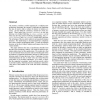Free Online Productivity Tools
i2Speak
i2Symbol
i2OCR
iTex2Img
iWeb2Print
iWeb2Shot
i2Type
iPdf2Split
iPdf2Merge
i2Bopomofo
i2Arabic
i2Style
i2Image
i2PDF
iLatex2Rtf
Sci2ools
128
click to vote
ASPLOS
1991
ACM
1991
ACM
Performance Evaluation of Memory Consistency Models for Shared Memory Multiprocessors
The memory consistency model supported by a multiprocessor architecture determines the amount of buffering and pipelining that may be used to hide or reduce the latency of memory accesses. Several different consistency models have been proposed. These range from sequential consistency on one end, allowing very limited buffering, to release consistency on the other end, allowing extensive buffering and pipelining. The processor consistency and weak consistency models fall in between. The advantage of the less strict models is increased performance potential. The disadvantage is increased hardware complexity and a more complex programming model. To make an informed decision on the above tradeoff requires performance data for the various models. This paper addresses the issue of performance benefits from the above four consistency models. Our results are based on simulation studies done for three applications. The results show that in an environment where processor reads are blocking an...
ASPLOS 1991 | Consistency Models | Processor Consistency | Programming Languages | Sequential Consistency |
Related Content
| Added | 27 Aug 2010 |
| Updated | 27 Aug 2010 |
| Type | Conference |
| Year | 1991 |
| Where | ASPLOS |
| Authors | Kourosh Gharachorloo, Anoop Gupta, John L. Hennessy |
Comments (0)

